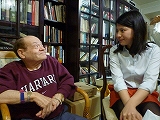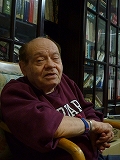 Nanami Aono (18), a Children’s Express Japan youth reporter, interviewed Bernard Krisher (80) on February 21st, 2012.
Nanami Aono (18), a Children’s Express Japan youth reporter, interviewed Bernard Krisher (80) on February 21st, 2012.
Bernard Krisher, a journalist working as Newsweek’s Asia Bureau Chief until 1980, founded American Assistance for Cambodia in the US and Japan Relief for Cambodia in Japan and the independent newspaper, the Cambodia Daily, in 1993. He launched the Sihanouk Hospital Center for the American charity HOPE in 1996. He has built more than 500 schools for the rural poor in Cambodia.
Nanami visited Phnom Penh in March 2011 with four other CE youth reporters and carried out interviews with local NGOs and the Cambodia Daily. She began to think about need income-generating projects that offer poor children the skills necessary to earn their own living. To learn more about how to develop such projects in Cambodia and what she should study during college, she met with Bernard Krisher.
Q. Why did you decide to help girls go to school?
A. I have to tell you about Nicholas Kristof, a writer for the New York Times. When he visited Poipet, he went to a brothel and talked to one of the working girls asking, “How did you get here?” The girl replied, “I was trafficked.” She wanted to quit prostitution and so we paid her money to open a shop, but she disappeared. Another girl, rescued by Nicholas, ran off with her boyfriend. I realized that I was not able to help these girls. So I decided to start to help girls go to school. I think education is the best way to help the poor children in Cambodia.
Q. What do you emphasize in your projects?
A. Our projects aim not to rescue children but to prevent them from straying to the wrong way of life. We encourage them to go to school, to have peers, and to connect with other people. Once they leave school, it is hard to return. School means a better job, a chance to go to university, and to become a homemaker. We are also educating girls about healthcare including HIV and parents too because we need their support. Our project is called “Girls be Ambitious” giving poor families $10 a month to prevent girls from child trafficking by going to school every day. We stop giving $10 if the girls stop going to school.
Q. Have you had any difficulties working with Cambodians?
A. Not really, but the language can be a problem. People inPhnom Penh might be able to speak English but people in the villages cannot. So, foreigners can’t work in the villages without interpreters.
Q. How have you found reliable staff inCambodia?
A. My staff is very loyal to me, because they appreciate what I am doing and how I treat them. However, one problem in Cambodia is Cambodians do not truly understand loyalty. The culture has a sense of cruelty as you see in the fresco paintings in Angkor Watt, which describe many cruelties. Also, you have heard about Pol Pot’s genocide. Cambodians have experienced too much jealousy, criticism, and fighting amongst themselves mainly due to the lack of education. So, trivial matters become quite important to them. We try to teach the importance of distinguishing between trivial and important matters in their lives.
Q. How did you find your staff when you first began in Cambodia?
A. When Prince Norodom Sihanouk returned to Cambodia in 1991 after the Paris Peace Accords, and Hun Sen established a monarchy again, I had dinner with Prince Sihanouk and he asked me to help with the restoration and the reconstruction of Cambodia.
I met Mrs. Nuon Phaly, President of the Future Light Orphanage through Prince Sihanouk and she asked me to hire her nephew Thero. He is polite and intelligent, and became my assistant. Thero is very honest, and so I could hire reliable staff through him.
Q. How did you meet Prince Sihanouk?
A. I interviewed President Sukarno of Indonesia for Newsweek and he liked me. When I went to Jakarta again, President Sukarno introduced me to Prince Sihanouk.
Q. I understand that bribes need to be paid when dealing with the Cambodian government. What percentage of your project’s total budget is spent on bribes?
A. We have never paid a bribe. I just said, “I don’t pay bribes because I’m helping your country.” In addition, I am not asked for bribes because I am a friend of the king. Furthermore, if you pay once, you have to pay forever.
Q. What is the main reason you could succeed with your business development?
A. Success is my personality as I never give up. I believe nothing is impossible, and everything is possible. My friends call me “a pusher.” Anything I want to do, I keep pursuing. That is why I could have a private interview with Emperor Hirohito as the first foreign correspondent in Japan.
Q. Have you laid off staff?
A. I never lay off staff unless they are disloyal or dishonest. Teachers in our school including computer teachers are an exception. As donors pay their salaries, if we don’t receive donations they have to be let go. However, we usually assign the teachers to another school. We give them one-months notice. Sometimes, we give staff who served for a long time some kind of compensation as they don’t have unemployment insurance inCambodia.
Q. I really want to stop child prostitution. What do you think I should study in college?
A. Psychology, counseling, and sociology. In addition, you should get experience working in some organizations. There is trafficking in Japan, too. People from Vietnam and other countries are also in trouble. You should find an organization helping them, work for that organization, talk to the people involved, and ask what the problems are. Then you could work in the developing countries. Practical experience is important. It is not possible to understand only by learning at school.
Q. Did your organization received grants from the Asian Development Bank and the World Bank?
A. I used to receive matching funds, that is, they gave half of the money to build the schools. However, due to the recession the amount of funds is quite limited now. However, we have received grants from Keidanren CBCC (Council for Better Corporate Citizenship) for hospital and school projects inCambodia.
Q. If you had another life, what would you do?
A. I would do the same thing all over again.